 |
| August 10, 2021 | Volume 17 Issue 30 |
Designfax weekly eMagazine
Archives
Partners
Manufacturing Center
Product Spotlight
Modern Applications News
Metalworking Ideas For
Today's Job Shops
Tooling and Production
Strategies for large
metalworking plants
Audi bringing electric propulsion to grueling Dakar Rally race
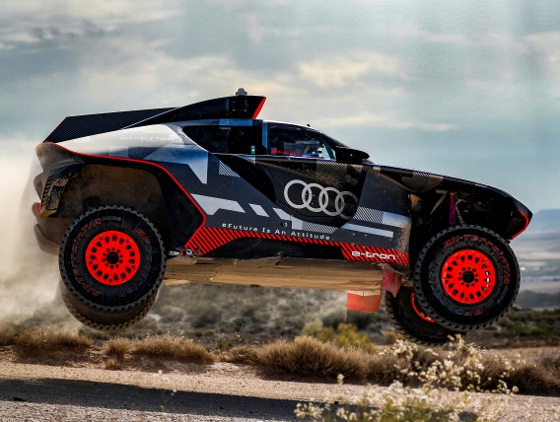
Can Audi's electric vehicle systems, including its battery tech, take the punishment of the world's toughest race?
The Audi quattro revolutionized rallying in 1981, and today permanent four-wheel drive is a standard automotive feature -- and not only for rally cars. Audi was also the first brand to win the Le Mans 24 Hours with an electrified drivetrain.
Now, Audi Sport engineering is at it again. This time, they have created a far-out, high-tech test laboratory in the form of the Audi RS Q e-tron, a specially designed racer with the first electrified drivetrain to compete against conventionally powered competitors at the Dakar, the world's toughest rally race.
Audi engineers are looking to usher in a new era at the Dakar Rally while testing and further developing their e-tron technology under extreme conditions. They can't go pure electric, though, because there are no charging stations in the desert during the marathon racing event that lasts almost two weeks and features daily stages that are up to 500 miles long.
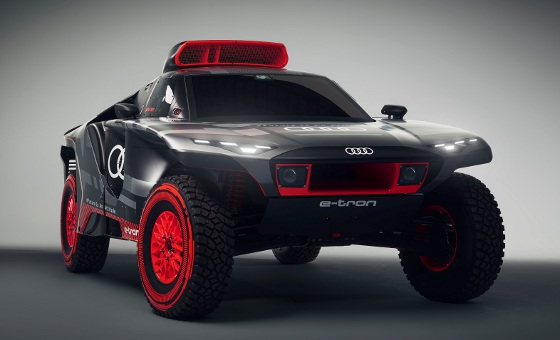
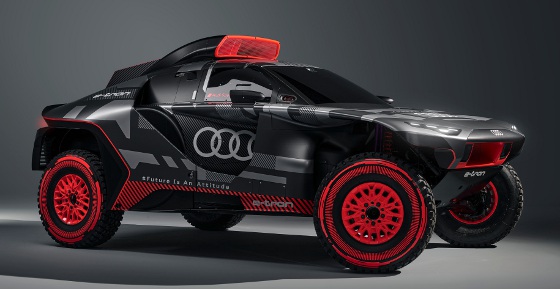
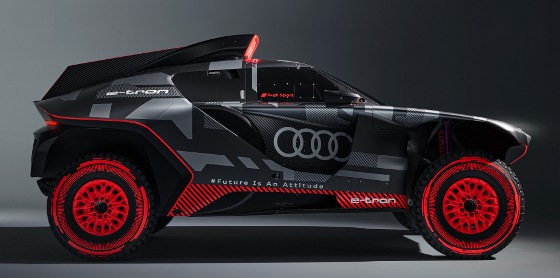
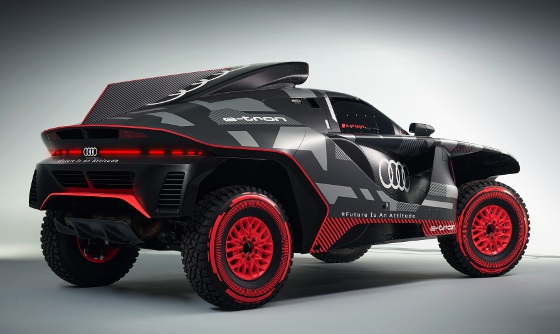
So Audi has chosen an innovative charging concept: On board the RS Q e-tron is the highly efficient Audi turbo fuel stratified injection (TFSI) engine from the DTM, an Audi race car. It is part of an energy converter that charges the high-voltage battery while driving. The drivetrain of the Audi RS Q e-tron is electric. The front and rear axles are both fitted with a motor-generator unit (MGU) from the current Audi e-tron FE07 Formula E car which has been developed by Audi Sport for the 2021 season. Only minor modifications had to be made to use the MGU in the Dakar Rally car.
A third MGU, of identical design, is part of the energy converter and serves to recharge the high-voltage battery while driving. In addition, energy is recuperated during braking. The battery weighs about 370 kg (815 lb) and has a capacity of around 50 kWh. Audi did not provide an mpg figure for the car.
"The battery is also a proprietary development that we have realized together with a partner," said Stefan Dreyer, head of Development at Audi Sport for motorsport projects. "As engineers, we basically see development potential in every component. But in terms of the drivetrain system, we have already achieved a system efficiency of over 97 percent in Formula E. There's not much more room for improvement. The situation is quite different with the battery and energy management. This is where the greatest development potential lies in electromobility in general. What we learn from the extremely challenging Dakar project will flow into future production models. As always, we are also working closely with our colleagues from road car development on this project."
The maximum system power of the e-drivetrain is 500 kW. How much of this may be used during the Dakar Rally is still being finalized by the organizers. The electric drivetain offers many advantages. The electric motors can be controlled extremely precisely, so they can help ensure good drivability. In addition, braking energy can be recovered.
"The idea is to intelligently connect the various components of the battery, electric drive, and combustion engine and to ensure optimal interaction under extreme conditions," said Julius Seebach, managing director, Audi Sport, in an online Audi interview. "The Dakar Rally is one of the biggest challenges in motorsport. Above all, however, it offers us as an automobile manufacturer the opportunity to test new technologies in the context of motor racing for possible future series production. Most racing series today are very heavily regulated and leave little room for innovation that could possibly also fuel series development later on."
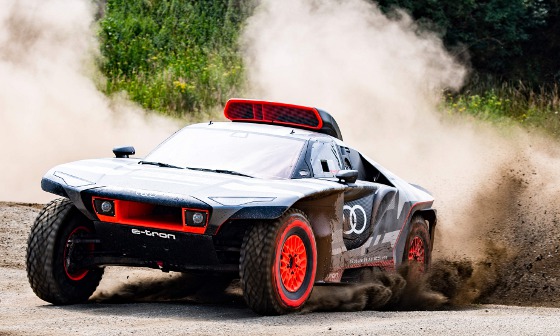
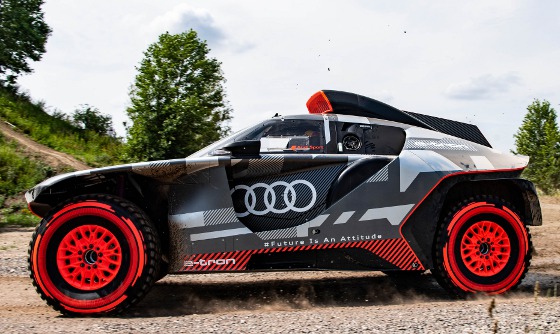
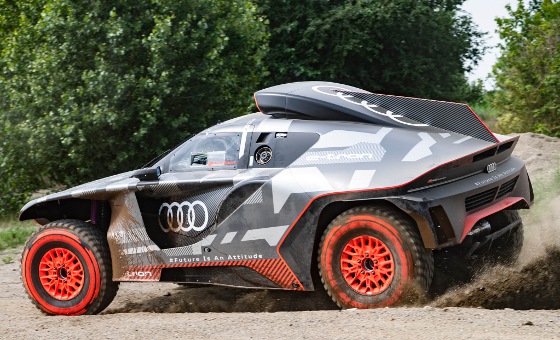
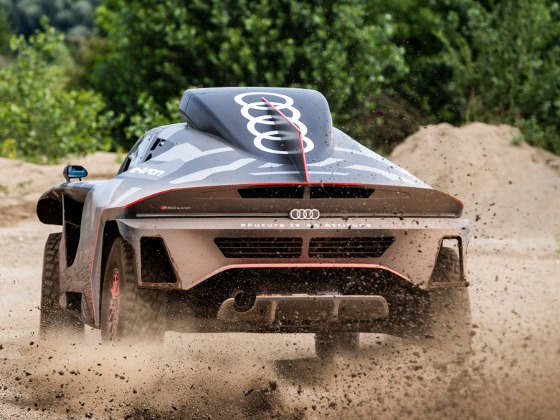
The Audi RS Q e-tron only needs one forward gear. The front and rear axles are not mechanically connected, as is also common in electric vehicles. The software developed by Audi takes over the torque distribution between the axles and thus creates a virtual and freely configurable center differential, which has the positive side effect of being able to save the weight and space that woud have been required by propshafts and a mechanical differential.
Visually, the Audi RS Q e-tron also differs significantly from conventionally powered Dakar prototypes. "The vehicle looks futuristic and has many design elements that are typical of Audi," said Juan Manuel Diaz, team leader of Motorsport Design at Audi. "Our aim was to symbolize Vorsprung durch Technik [progress through technology] and the future of our brand."
"It represents future technology that can withstand the most extreme conditions," added Seebach. "In a racing car, the motto is: Form follows function. However, our design team has once again proven the high level at which they work, because our Audi RS Q e-tron also looks fantastic and stands out clearly against the previous Dakar prototypes."
"Audi has always chosen new and bold paths in racing, but I think this is one of the most complex cars that I have ever seen," said the team's principal, Sven Quandt. "The electric drivetrain means that a lot of different systems have to communicate with each other. Besides reliability, which is paramount in the Dakar Rally, that's our biggest challenge in the coming months."
Quandt compares Audi's Dakar project to the first moon landing. "Back then, the engineers didn't really know what was coming. It's similar with us," he said. "If we finish the first Dakar event, that's already a success."
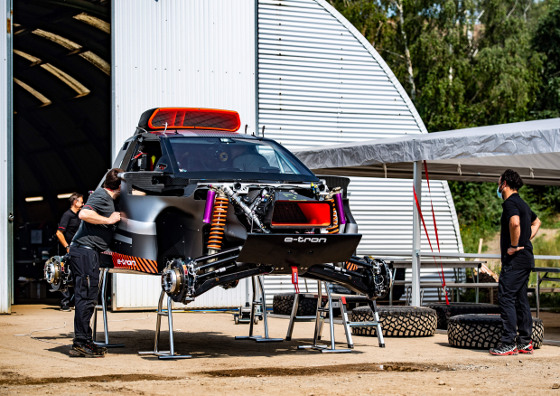
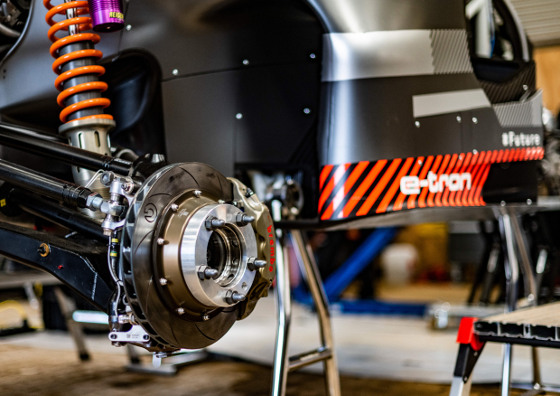
The prototype of the Audi RS Q e-tron had its first roll-out in Neuburg at the beginning of July. An intensive test program and the first test entries at cross-country rallies are on the agenda from now until the end of the year.
The 2022 Dakar Rally will take place January 2-14, 2022, in Saudi Arabia. It will begin in Ha'il, snake south and west to Riyadh, and continue south and west to end in Jeddah. This will be the third year in a row that the event is held in Saudi Arabia.
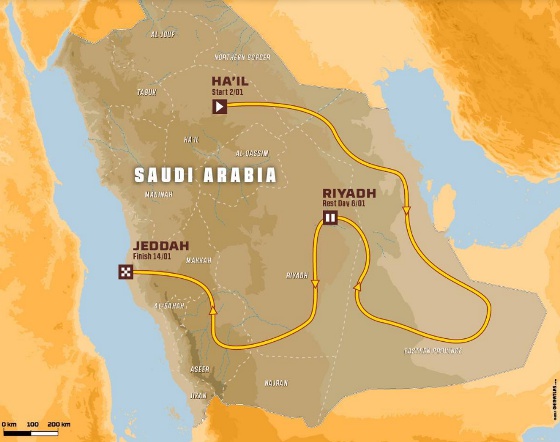
2022 Dakar Rally route. [Credit: ASO]
At the beginning of August, the Audi RS Q e-tron concept completed an eight-day endurance test in sweltering heat in Spain on gravel sections of the kind typically used in cross-country rallies.
All three of Audi Sport's driver teams took part in the test in Aragon, Spain. Dakar record winner Stéphane Peterhansel and his co-driver Edouard Boulanger drove the first stint from Friday to Sunday. Mattias Ekström and Emil Bergkvist took over the Audi RS Q e-tron on Monday for the next two test days. Carlos Sainz and Lucas Cruz concluded the intensive trials from Wednesday to Friday.
The three driver teams were impressed with the handling and reliability of the futuristic SUV on the fast gravel sections. "For a first test in proper conditions for the car, I'm really happy how the car behaves already," said Sainz on behalf of his fellow drivers. "I had a really good feeling straight away. Of course, there is fine-tuning to be done, but the starting point is good."
On the 10.5-mile long gravel sections, the Audi RS Q e-tron achieved a top speed of 112 mph. In addition, temperatures of up to 93 F in the shade marked an initial litmus test for the cooling concept of the complex vehicle.
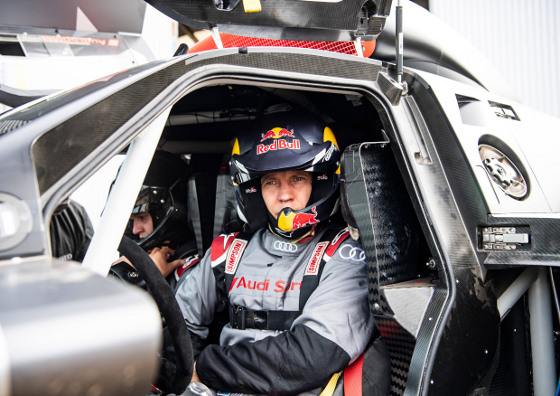
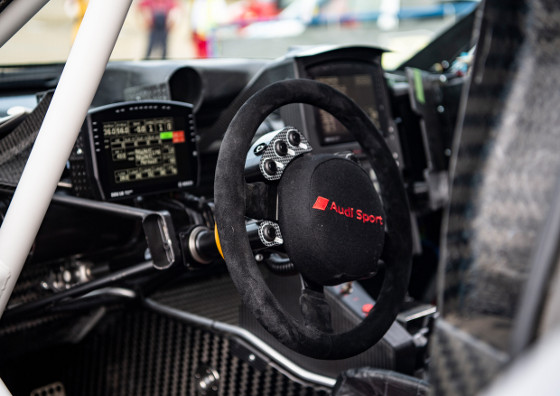
"This test was focused on getting in as much driving as possible and detecting weak spots," development engineer Arnau Niubó Bosch said after more than 1,000 test miles in extremely harsh conditions. "The next test in September will take us into the dunes for the first time."
"This project's schedule is extremely packed and challenging," said Andreas Roos, who is responsible for the factory motorsport commitments at Audi Sport. "Less than twelve months have passed since the project officially started. We had to begin the development while the regulations for alternatively powered vehicles had not even been finalized yet. And all of the development took place during the Corona pandemic. You mustn't underestimate that either. What the team has achieved so far is unique. The roll-out was a very special moment for everyone."
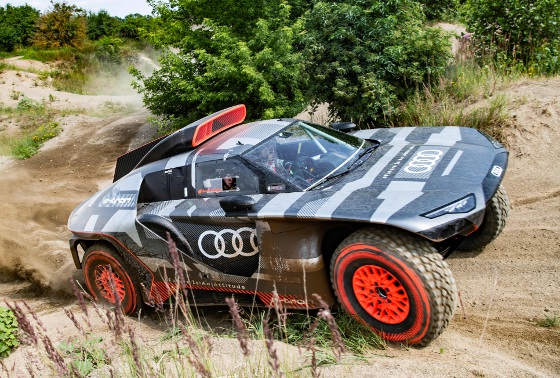
Learn more about the Dakar rally at www.dakar.com/en/.
Sources: Audi Motorsport, ASO
Published August 2021
Rate this article
View our terms of use and privacy policy
